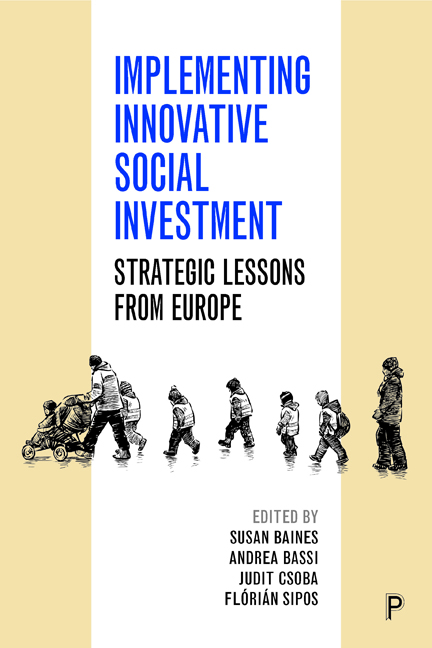Book contents
- Frontmatter
- Contents
- List of tables, figures, images and boxes
- Notes on contributors
- Acknowledgement
- one Social Investment in welfare: a sub-national perspective
- Part A Children and families: early intervention in people’s life courses
- Part B From a caring state to an investing state: labour market activation
- Part C Social solidarity and Social Investment
- Index
ten - Revitalising the self-sufficient household economy: the Social Land Programme in Hungary
Published online by Cambridge University Press: 21 April 2022
- Frontmatter
- Contents
- List of tables, figures, images and boxes
- Notes on contributors
- Acknowledgement
- one Social Investment in welfare: a sub-national perspective
- Part A Children and families: early intervention in people’s life courses
- Part B From a caring state to an investing state: labour market activation
- Part C Social solidarity and Social Investment
- Index
Summary
Introduction: the Social Land Programme
The Social Land Programme (hereafter, SLP) is an active social policy programme serving as an alternative to passive benefits. The SLP mainly targets socially disadvantaged persons and families who live in small, rural communities and who do not possess the capital needed for agricultural production. The objective of the programme is not employment, but the household economy, and beneficiaries participate as independent small-scale producers. The organisation of the SLP is the responsibility of municipalities. This case study comprised eight rural communities participating in the SLP.
The background to the SLP is increasing rural poverty following the fall of the communist regime. Hungarian governments sought local solutions for lost employment, combining the characteristics of the private and the state sectors. Household plots providing additional income had been well established in Hungary before the fall of communism. From the beginning of the 1990s, lagging agricultural regions started to become pauperised and reviving lost traditions of household farming and horticulture seemed to be an appropriate solution to rural poverty (Jász, 2003; Nagyné Varga, 2007; Rácz, 2009; Vida and Vidra, 2015; Csoba, 2017). An additional goal was to reinforce local communities and to reduce the social and economic tensions that came into existence due to the lack of income (Szoboszlai, 1999; Bartal, 2001).
Revitalising the household economy
Unemployment and lack of income, especially in rural regions
Between 1989 and 1992, almost 30% of all jobs ceased to exist in Hungary and a million people became unemployed (Csoba, 2010). The majority were unskilled individuals or those who did not have a marketable profession. They were mainly commuters between the countryside and city, but due to the ever-narrowing labour market, they had to return to their home villages. With the transformation of socialist cooperatives, the previous cooperative members in the villages lost their livelihood and land property. The tradition of the household economy – the ability to be self-sufficient – slowly disappeared in these families. In addition to this, because of the de-urbanisation processes and gentrification of inner-city ghettoes, a selective migration started in the 1990s from urban to rural areas. Highly disadvantaged (mostly Roma) people bought properties in poor rural municipalities with low prices, where the labour opportunities were already decreasing.
- Type
- Chapter
- Information
- Implementing Innovative Social InvestmentStrategic Lessons from Europe, pp. 165 - 178Publisher: Bristol University PressPrint publication year: 2019



